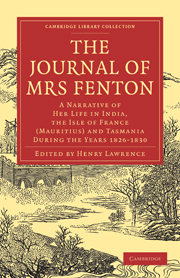 The Journal of Mrs Fenton
The Journal of Mrs Fenton Published online by Cambridge University Press: 07 September 2011
My dear and kind Friend,—Shortly after my arrival in Calcutta I sat down to write in reply to that letter which reached me on board the Cornwall; it seemed my last link with country, home, and all the heart's affections, and many a time and oft was it read: in truth, I think I could have repeated it verbatim from the fact of having placed it in my dressing-box, to which instinctively my hand reached on every day I was able to sit up to have my hair combed. After duly announcing my arrival, I had proceeded to give you all the good reasons which prevented my compliance with the request contained in that letter—at least they were very sincere—as it seemed quite absurd to suppose that where men of genius and learning had written on the subject, anything I could say should be worth reading; even to enter on a path where so many formidable competitors had gone before seemed too nearly allied to vanity. All this I clearly expressed, and doubted not that the truth of the statement would be as visible to yourself as to me. Once more I read your letter, and made a full stop at that passage where you say, ‘No history of India, however wise and authentic, ever conveyed to me what I wished to know—a familiar picture of the everyday occurrences, manners, and habits of life of persons undistinguished either by wealth or fame. I care not whether Ram Row was poisoned or strangled, but should like to be able to realise to my own mind the actual situation and pursuits of my many friends there, and above all, whatever may more particularly concern yourself.’
To save this book to your Kindle, first ensure no-reply@cambridge.org is added to your Approved Personal Document E-mail List under your Personal Document Settings on the Manage Your Content and Devices page of your Amazon account. Then enter the ‘name’ part of your Kindle email address below. Find out more about saving to your Kindle.
Note you can select to save to either the @free.kindle.com or @kindle.com variations. ‘@free.kindle.com’ emails are free but can only be saved to your device when it is connected to wi-fi. ‘@kindle.com’ emails can be delivered even when you are not connected to wi-fi, but note that service fees apply.
Find out more about the Kindle Personal Document Service.
To save content items to your account, please confirm that you agree to abide by our usage policies. If this is the first time you use this feature, you will be asked to authorise Cambridge Core to connect with your account. Find out more about saving content to Dropbox.
To save content items to your account, please confirm that you agree to abide by our usage policies. If this is the first time you use this feature, you will be asked to authorise Cambridge Core to connect with your account. Find out more about saving content to Google Drive.